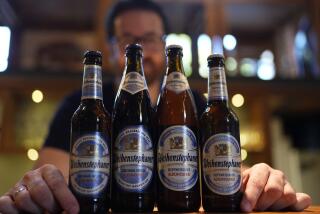Brewer Spends Millions to Promote ‘Responsible-Drinking’ Programs
- Share via
ST. LOUIS — Spring break has arrived and college kids are rolling out the barrels.
But Anheuser-Busch Cos. Inc., parent of the world’s largest brewery, is urging restraint. The company spends millions of dollars each year promoting what it calls “responsible-drinking” programs.
Some are considered particularly relevant at this time of the year, when students descend upon resort cities from Miami to Palm Springs and indulge in brew-guzzling marathons that aren’t particularly welcomed by the locals.
Entertainer Sonny Bono, mayor of Palm Springs for the past 10 months, said his city’s residents have long tried to curb the level of alcohol consumption during spring break.
“A couple of the events are cruising and drinking and getting out of hand,” Bono said. “For the locals, it’s a time we dread.”
Enter Anheuser-Busch, which tries to get its message across before the students hit town. On campuses across the country, college newspapers advertise “Pit Stops” where students en route to spring break destinations can pull over and get a doughnut and a cup of coffee.
“Here it’s someone selling alcohol and saying, ‘Don’t abuse it and don’t get carried away,’ ” Bono said. “I like it.”
The St. Louis-based brewing giant says it is committed to keeping customers from over-indulging. The number of responsible-drinking programs sponsored by the company nearly equals the number of its brands.
Choices include: Budweiser, Bud Light, Busch, Natural Light, L.A., Michelob and Michelob Dry. To keep thirsty drinkers in line, the company offers programs such as the “Your Alcohol IQ” videotape, Know When to Say When, The Buddy System, Good Sport, T.I.P.S., I’m Driving, and Alert Cab.
Anheuser-Busch sold 78.5 million barrels of beer last year, 41.1% of the total brewing industry sales nationwide. But for more than a decade, the brewery hasn’t been content to simply sell beer in record quantities.
According to a recent Fortune Magazine survey, Anheuser-Busch ranks first among beverage companies in responsibility to the community and environment.
“I don’t know if social conscience is the right word,” said Stephen K. Lambright, vice president and group executive at Anheuser-Busch, who oversees the company’s responsible-drinking programs. “It’s a social commitment. We hope to be part of the solution. Hopefully, what we’re doing is something that’s more than just a PR piece.”
At first glance, Anheuser-Busch’s sobriety theme in the spring break pilgrimage south by winter-weary college kids might have the unwanted side effect of forfeiting part of this lucrative market. But it appears far more successful than the sophomoric partying theme by rival Miller Brewing Co.
Miller recently scrapped what it now concedes was a poor-taste ad campaign for spring-break getaways after college students complained it was sexist and they threatened to boycott Miller products. The brewer’s supplements in college newspapers last month featured pictures of bikini-clad women clutching Miller bottles and tips for men on “sure-fire ways to scam babes.”
Anheuser-Busch doesn’t have anything as easy as a barrel count to determine the success of its responsible drinking program. Lambright, however, pointed out that the number of underage beer drinkers and fatalities in alcohol-related accidents both have decreased in recent years.
“We certainly don’t have all of the answers, but the statistics are all moving in the right direction,” Lambright said. “The system is getting better.”
Among the company’s programs, and advertisements touting them:
At sports events, messages from professional athletes are beamed on the big screen, and billboards remind the fans to be a “Good Sport” and not over-indulge.
At local video stores, L.A. Law stars Jill Eikenberry and Michael Tucker are featured in the brewery’s newest program, “Your Alcohol IQ.” Anheuser-Busch distributed 25,000 free copies to video outlets nationwide.
And who hasn’t seen Spuds MacKenzie and the Spudettes advising television watchers to moderate their alcohol intake?
The concept of a beer company advising restraint in the consumption of its products isn’t all that new anymore. Anheuser-Busch says its first programs began in the late 1970s.
But the brewery didn’t go high-profile until 1985, when its first advertisement for responsible drinking aired. Role models such as sports stars Steve Garvey and Patrick Ewing were hired to tell the public to “Know When to Say When,” a program that provides guidelines for bartenders, waiters and waitresses.
“They weren’t beer commercials by any means,” Lambright said. “Prior to that, most of what you saw were third-party efforts in the public-service announcement mode as opposed to a company actually paying for regular price commercial time to run a non-beer commercial responsibility piece.”
Collectively, Anheuser-Busch’s strategy for fighting alcohol abuse is “Operation ALERT,” an acronym for Action and Leadership through Education, Responsibility and Training. The array of programs designed as aids for the estimated 80 million beer drinkers in the United States runs the gamut.
There’s T.I.P.S., which stands for Training for Intervention Procedures by Servers of Alcohol, an instruction manual to teach retailers how to recognize and avoid troublesome situations involving alcohol. And Good Sport, a campaign aimed at combatting rowdyism in stadiums and arenas.
The Buddy System is designed for use with college-age audiences. It recommends holding parties with a dry last hour, and establishing a network of friends to serve as designated drivers.
Alert Cab, a program in 140 cities, provides a free taxicab ride home for customers in bars and restaurants who are faced with possible drunk driving situations. I’m Driving is another designated-driver program.
Anheuser-Busch also is a major sponsor of SADD, Students Against Drunk Driving, and has published pamphlets dealing with the effects of alcohol consumption on motorcycle and boating safety.
More to Read
Inside the business of entertainment
The Wide Shot brings you news, analysis and insights on everything from streaming wars to production — and what it all means for the future.
You may occasionally receive promotional content from the Los Angeles Times.










